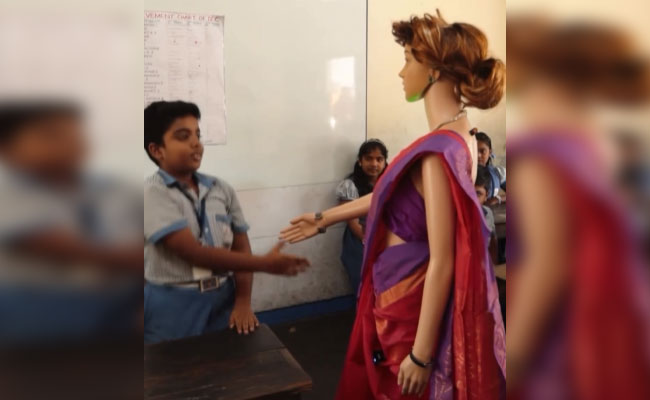Thiruvananthapuram (PTI): "What is the most expensive thing in the world," was a question asked by a student from the KTCT Higher Secondary School in Kallambalam here loudly, even as a humanoid draped in a saree listened attentively.
A necklace on the humanoid changed colour from green to orange, and it shook its head before giving out the answer with informative details as other children curiously listened.
This silk saree-draped humanoid is 'Iris', the first AI teacher unveiled in Kerala.
A disturbed network connection and the chatter from the children often slowed down Iris as it tried to catch the noises, presuming them to be questions asked to 'her'. And when there were too many noises, Iris took time to process the question.
But when the hall was silent and a student asked a question, either from their syllabus or anything under the sun, Iris gave out the answer in no time, with examples and references.
"Our next step is to give her 'eyes' so that she will identify each student and answer their questions. She would be becoming more interactive and completely automated," said Abhijith, an 8th standard student and one of the students who closely worked with Makerlabs Edutech Private Limited in the development of this AI-based teacher as part of an initiative of the Atal Tinkering Lab at the school.
He said that the AI teacher will not be able to answer the questions of the children if the classroom is noisy, so this teacher will make children more disciplined.
"The children are very excited, especially the lower KG students. They like this 'teacher' because she never gets angry or irritated and always has an answer to their questions. She also does not ask questions and never gives homework," Meera Suresh, the principal of the KTCT Higher Secondary School, told PTI.
Iris works on the generative AI principle with a capacity to convert voice into texts and also texts into voice. It can handle three languages and even shake hands with the students on request. It can also tell stories to the children.
"We have teachers who are experts in their subject. But the AI teacher is an expert in all subjects and never gets tired of answering the questions.
"Though it can answer all the questions, it is never going to be a replacement for teachers as it does not understand emotions and cannot care. This is just a support system for the teaching staff," Meera Suresh said.
The Iris humanoid moves on four wheels, turns its head both ways, and can also move its hands. The microphones are kept as a necklace on Iris, and it uses a speaker to talk back.
"The humanoid is developed by the Makerslab, whose faculty come to our Atal Tinkering Lab to train the students. The students have been learning all about AI and its process for the last four months at the lab," Akhila M, student coordinator and teacher at the school, said.
The Central Government gave a grant of Rs 20 lakh to this private, unaided school for establishing the Atal Tinkering Lab.
This school regularly takes part in the state youth festival and the state school science festival, and that helped them bag this project, which otherwise is given only to government-aided schools.
"The management also contributed another Rs 20 lakh and set up the lab. We selected the students based on their interest and capabilities in technology-based learning. Next year onwards, we are going to include one period during regular class hours for the Atal Tinkering Lab," Meera Suresh said.
View this post on Instagram
Let the Truth be known. If you read VB and like VB, please be a VB Supporter and Help us deliver the Truth to one and all.
Kalaburagi: Four men have been arrested in Kalaburagi on charge of hacking a man with lethal weapons and pelting stones at him under the limits of Station Bazaar Police Station recently.
According to police sources, Anand Jalak Shinde (34), Ashitosh Jalak Shinde (30), Imran Mehboob Sheikh (28) and Sohaib Anwar Qureshi have been arrested. The men are accused of the brutal murder of Syed Mehboob, a resident of Station Bazaar Upper Line Hamalawadi in the city.
An FIR was filed by the Station Bazaar Police Station based on a complaint given by Syed Ismail, father of the deceased Syed Mehboob.
Following quick probe, the police team successfully arrested the suspects within 24 hours. The arrested men were produced in court and have been sent to judicial custody.
The City Police Commissionerate has appreciated in an official release the police team’s quick solving of the murder case and arrest of the four men accused of murdering Syed Mehboob.





